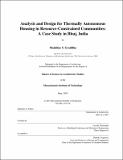Analysis and design for thermally autonomous housing in resource-constrained communities : a case study in Bhuj, India
Author(s)
Gradillas, Madeline S
DownloadFull printable version (174.0Mb)
Other Contributors
Massachusetts Institute of Technology. Department of Architecture.
Advisor
Leon R. Glicksman.
Terms of use
Metadata
Show full item recordAbstract
In the 2010 International Workshop on Housing, Health and Climate Change Meeting Report, the World Health Organization identifies housing as a primary cause of poor health in developing countries. The report cites inadequate protection from extreme heat as one of six major concerns for healthy housing environments. As India's population rapidly increases, informal settlements face particular heat risk because of harsh climate conditions, sub-standard building construction and lack of access to electricity for mechanical cooling. There is a need for housing to provide thermal comfort and health by passive means at low cost. Climate specific passive cooling techniques are well known, but are rarely implemented in informal settlements because of density, lack of resources, design integration, and materials availability. This thesis is situated in the practical connection of two normally disparate parts: applied research in passive cooling techniques, and design for development. The work presented results from the establishment of an international co-design partnership between MIT and The Hunnarshala Foundation for Building Technology and Innovations, an NGO based in the hot and arid region of Bhuj, India. It presents data analysis and codesign work that drove the development, field prototyping, and evaluation of appropriate, implementable building solutions to improve thermal conditions in affordable housing in hot and arid climates. New low-cost, multi-layered roof assembly designs are presented and evaluated. Experimental results show that even in severe arid climates the interior conditions can approach ASHRAE and EN 15251 Adaptive Thermal Comfort standards through most of the operating hours. The results of this research will be an important contribution to the designs of the initial phase of the large-scale Rajiv Awas Yojana Slum Free Bhuj re-development housing construction over the next five years in Western India.
Description
Thesis: S.M., Massachusetts Institute of Technology, Department of Architecture, 2015. This electronic version was submitted by the student author. The certified thesis is available in the Institute Archives and Special Collections. Cataloged from student-submitted PDF version of thesis. Includes bibliographical references (pages 154-157).
Date issued
2015Department
Massachusetts Institute of Technology. Department of ArchitecturePublisher
Massachusetts Institute of Technology
Keywords
Architecture.